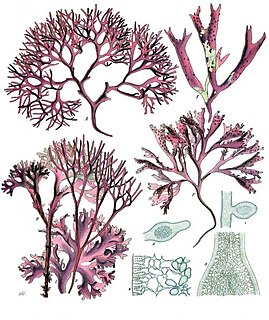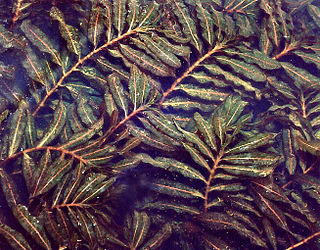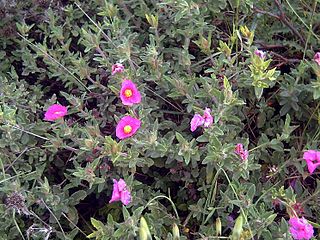
Chondrus crispus—commonly called Irish moss or carrageen moss —is a species of red algae which grows abundantly along the rocky parts of the Atlantic coast of Europe and North America. In its fresh condition this protist is soft and cartilaginous, varying in color from a greenish-yellow, through red, to a dark purple or purplish-brown. The principal constituent is a mucilaginous body, made of the polysaccharide carrageenan, which constitutes 55% of its dry weight. The organism also consists of nearly 10% dry weight protein and about 15% dry weight mineral matter, and is rich in iodine and sulfur. When softened in water it has a sea-like odour and because of the abundant cell wall polysaccharides it will form a jelly when boiled, containing from 20 to 100 times its weight of water.
Crispus Attucks was an American stevedore of African and Native American descent, widely regarded as the first person killed in the Boston Massacre and thus the first American killed in the American Revolution. Historians disagree on whether he was a free man or an escaped slave, but most agree that he was of Natick and African descent. Two major sources of eyewitness testimony about the Boston Massacre published in 1770 did not refer to him as "black" nor as a "Negro"; it appears that Bostonians viewed him as being of mixed ethnicity. According to a contemporaneous account in the Pennsylvania Gazette, he was a "Mulattoe man, named Crispus Attucks, who was born in Framingham, but lately belonged to New-Providence, and was here in order to go for North Carolina."

Flavius Julius Crispus was the eldest son of the Roman emperor Constantine the Great and his junior emperor (caesar) from March 317 until his execution by his father in 326. The grandson of the augustus Constantius I, Crispus was the elder half-brother of the future augustus Constantine II and became co-caesar with him and with his cousin Licinius II at Serdica, part of the settlement ending the Cibalensean War between Constantine and his father's rival Licinius I. Crispus ruled from Augusta Treverorum (Trier) in Roman Gaul between 318 and 323 and defeated the navy of Licinius I at the Battle of the Hellespont in 324, which with the land Battle of Chrysopolis won by Constantine forced the resignation of Licinius and his son, leaving Constantine the sole augustus and the Constantinian dynasty in control of the entire empire. It is unclear what was legal status of the relationship Crispus's mother Minervina had with Constantine; Crispus may have been an illegitimate son.

The Dalmatian pelican is the largest member of the pelican family, and perhaps the world's largest freshwater bird, although rivaled in weight and length by the largest swans. They are elegant soaring birds, with wingspans that rival that of the great albatrosses, and their flocks fly in graceful synchrony. With a range spanning across much of Central Eurasia, from the Mediterranean in the West to the Taiwan Strait in the East, and from the Persian Gulf in the South to Siberia in the North, it is a short-to-medium-distance migrant between breeding and overwintering areas. No subspecies are known to exist over its wide range, but based on size differences, a Pleistocene paleosubspecies, P. c. palaeocrispus, has been described from fossils recovered at Binagady, Azerbaijan.

Flavia Maxima Fausta was a Roman empress. She was the second wife of Constantine the Great, who had her executed and excluded from all official accounts, possibly due to adultery with her stepson, Crispus.

Rumex crispus, the curly dock, curled dock or yellow dock, is a perennial flowering plant in the family Polygonaceae, native to Europe and Western Asia.

The Japanese serow: (羚羊) is a Japanese goat-antelope, an even-toed ungulate mammal. It is found in dense woodland in Japan, primarily in northern and central Honshu. The animal is seen as a national symbol of Japan, and is subject to protection in conservation areas.

The Battle of the Hellespont, consisting of two separate naval clashes, was fought in 324 between a Constantinian fleet, led by the eldest son of Constantine I, Crispus; and a larger fleet under Licinius' admiral, Abantus. Despite being outnumbered, Crispus won a very complete victory.

Crispus Allen is a fictional character in the DC Comics universe, mostly commonly depicted in association with Batman.

Crispus Attucks High School is a high school of the Indianapolis Public Schools in Indianapolis, in the U.S. state of Indiana. It is named for Crispus Attucks, an American patriot killed during what became known as the Boston Massacre. The school was built near Indiana Avenue northwest of downtown Indianapolis and opened on September 12, 1927, when it was the only public high school in the city designated specifically for African Americans. Despite the passage of federal and state school desegregation laws, Attucks was the city's only high school with a single-race student body in 1953, largely due to residential segregation, and remained a segregated school until 1971. Attucks was converted to a junior high school in 1986, due to declining enrollment, and a middle school in 1993. It became a medical magnet high school in 2006, partially due to the school's proximity to the campus of the Indiana University School of Medicine and its associated hospitals.

The Attucks Theatre, located in Norfolk, Virginia, United States, was financed, designed and constructed by African American entrepreneurs in 1919. The theatre was designed by Harvey Johnson, an African-American architect. The theatre was named in honor of Crispus Attucks, an African American who was the first patriot to lose his life in the Revolutionary War. When it was first opened, Attucks Theatre was known as the "Apollo Theatre of the South." It has hosted performers ranging from Cab Calloway to Redd Foxx. The theater hosted numerous famous entertainers through the 1920s, 1930s, 1940s and early 1950s, including Norfolk's Gary U.S. Bonds and Portsmouth's Ruth Brown.

Mastocarpus stellatus, also called Clúimhín Cait, carragheen, or false Irish moss, is a species of red algae closely related to Irish Moss, or Chondrus crispus. It is collected in Ireland and Scotland, together with Chondrus crispus as Irish moss, dried, and sold for cooking and as the basis for a drink reputed to ward off colds and flu.

Potamogeton crispus, the curled pondweed or curly-leaf pondweed, is a species of aquatic plant native to Eurasia but an introduced species and often a noxious weed in North America.

Carduus crispus, the curly plumeless thistle or welted thistle, is a biennial herb in the daisy family Asteraceae. It is native to Europe and Asia.
Lucius Junius Quintus Vibius Crispus was a Roman senator and amicus or companion of the Emperors, known for his wit. He was a three-time suffect consul.
Poropodalius is a genus of mites in the family Rhodacaridae.
Poropodalius acutus is a species of mite in the family Rhodacaridae.
Poropodalius basisetae is a species of mite in the family Rhodacaridae.

Cistus crispus is a shrubby species of flowering plant in the family Cistaceae, with pink to purple flowers, native to south-western Europe and western north Africa.

The Boston Massacre Monument, also known as the Crispus Attucks Monument and Victory, is an outdoor memorial by Robert Kraus, installed in Boston Common, in Boston, Massachusetts, United States.













